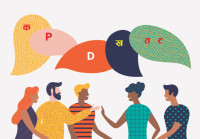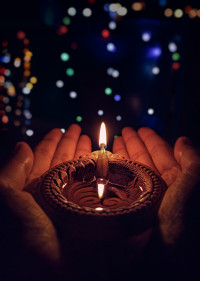As it is
What's in a name?
For the five years during which I lived in Nepal, my name was not mine. It was a reflection of my muddled identity.
June Karkee
Until the age of thirteen, I never cared for my name. And I suppose most of us don’t. Our name is given to us at birth and we accept it for what it is, as something that we can’t change and as something that sticks with us for the rest of our lives. But for me, my name has always been so much more than that. So what I really mean when I say I never cared for my name is that I disliked, even hated it, and therefore never truly accepted it as my own.
Jyoni was a name strategically given to me by my father, who is a diplomat, as a way for me to fit into the different places and cultures that my family and I would have to immerse ourselves in as we periodically moved to different countries. It was an “English sounding” name, having no special meaning or significance.
For the four years that I lived in Belgium, from ages five to nine, my name was accepted by my Belgian friends and teachers because it was easy to pronounce and it didn’t make the person uttering it uncomfortable. It was a name even my sisters used, and to this date, still do. But as convenient, simple and user-friendly as my name was for the “western” speaker, I never prided in having it because even at that age, I knew that there was a disconnect between my given name and who I was.
That sense of disconnect between my name and my identity followed me everywhere and grew stronger when I moved back to Nepal, where almost everyone around me had “Nepali sounding names.” Coupled with the British accent that I had acquired in the four years from studying in a British-English international school back in Belgium, my name began to separate me from the rest of my friends, who saw me as being an outsider and thus treated me differently. I could not understand why my “own” people, with whom I shared the same identity as a Nepali, treated me like the “other” and ironically, I began to feel like a stranger and a foreigner in my own country.
Throughout the five years that I lived in Nepal, my name in school would often become associated with the popular English nursery rhyme “Johny Johny Yes Papa,” which would be chanted by crowds of people whenever I participated in a sports event. My name would intentionally be pronounced with an exaggerated accent, by students and teachers both, in order to make me feel different, as if I didn’t already. My name would be questioned for its meaning and purpose, and inevitably, it would grow to become something that I disliked and wished to get rid of permanently.
For the five years during which I lived in Nepal, my name was not mine. It was a reflection of my muddled identity— one that I had no awareness of, but one that I constantly tried to create. By pretending to not be that great at English, and by intentionally mixing up Nepali words when speaking English because that was how everybody else in school spoke, I tried to seem more relatable and “be more Nepali,” although getting the highest score on English exams always told my friends otherwise. My father had probably never foreseen these realities when he first decided to name me, because as every parent does, he was only trying to do what he thought was best for me.
However, having listened to many of my frustrations and rants, he had a strong idea of how I despised and constantly disassociated myself from my “English sounding name.” So when he received the news that we would all be moving to the United States for four years yet again as a part of his job, one of the first things my father did was ask me whether I wanted to officially change my name and start fresh in a completely new place. Doing so meant erasing Jyoni as my name from all of my documents, stripping away its legitimacy and removing the part of my identity that I never learned to love. Jyoni had taught me so much and shaped so many of my experiences and the person I was then, but I was more than ready to create and claim an identity that I could accept and love. In answering my father’s question, without any hesitation, I said yes. Thus, at the age of 13 was when I began caring for my name.
Like my father, I strategically gave myself the name June. Although at first it was a name that had appealed to me because it “sounded pretty,” I soon realised that it was a name that could serve multiple purposes. While in English, June is the name of a month, and a name given to many girls, in Nepali, it means moon. It was a name that could be accepted where I was from, as well as wherever else I went to. I soon found out that my fraternal twin sister’s name, Jyotsna, in Nepali means moon’s light. I can still vividly remember the moment I had found out about those special connections, and how I had excitedly jumped around telling my mom that everything was just fated to be.
With so many special meanings and coincidences attached to it, June became the perfect name for me, and although it took some time getting used to, it did not take long for me to fall in love with and accept it. I moved to the States with my new name, and throughout the eight and a half years that I lived there, we both grew together. I began to realise that my identity—largely shaped by socially constructed ideas, meanings and symbols—had essentially become an abstract but consequential aspect of my life, and that my name was directly linked to it. In a perfectly mutual way, my identity had created my name and my name had created an identity for me. While my sisters and friends back in Nepal still called me by my old name, every new person that I made friends with and got to know used my real one—the one that I had chosen for myself, the one that I loved because it actually meant something, and the one that I was proud to utter because it truly felt like mine.
Evidently, people still question me about my name. Most are confused by how someone who looks the way I do has a name that belongs to a culture that I am not a part of. They ask me, “Isn’t June an English name?” I tell them it is both an English and a Nepali name. I tell them it is a combination and a reflection of all of the realities of my life; realities of not really having lived in a single place, but rather multiple places; not really having a fully American or fully Nepali accent, and not really knowing what exactly it is that defines a person. I tell them that names do not always carry special meanings and significances, but people do.
Every person grasps and clings onto different things in order to find meaning in their lives. To everyone who asks me about my name, I tell them it is something I cling to as a symbol of the entire process I have been through—and that I go through—in trying to create an identity for myself; an experience and story that is wholly and uniquely mine.




 14.12°C Kathmandu
14.12°C Kathmandu










